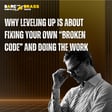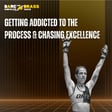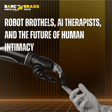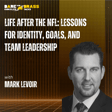Become a Creator today!Start creating today - Share your story with the world!
Start for free
00:00:00
00:00:01

Best of Episode!
George K and George A are out this week to keynote SecureWorld Toronto and host the Cyber Pitch Battle Royale. Catch up on interviews you may have missed with:
- Stacey Lokey-Day on collecting experiences to build your career
- Candace Williams on the keys to networking
- Allan Alford on the best ways vendors can engage with CISOs and ensure they stay in good graces
- Jessica Andree on how to build loyalty and performance through better talent acquisition
- Kate Wood on the top 3 pieces of advice for advancing your career
———
👊⚡️SUPPORT THE SHOW!
https://ko-fi.com/bareknucklesbrasstacks
For as little as $1 a month, you can support the show and get exclusive member benefits, or send a one-time gift!
Your contribution covers our hosting fees, helps us make cool events and swag, and it lets us know that what we're doing is of value to you.
We appreciate you!
Transcript
Introduction and Toronto Event Announcement
00:00:06
Speaker
Hey, Bare Knuckle Brawlers. We're off this week. We are headed to Toronto, where we will be keynoting Secure World Toronto at the beginning of the day, and then we will end it with the Cyber Pitch Battle Royale, our signature event.
Catch Up on Past Interviews
00:00:18
Speaker
We're looking forward to hosting a number of intrepid and brave sellers up on stage. So for this week, let's catch up on some episodes you may have missed. featuring the best of from interviews with Stacey Loki-Day, Candace Williams, Alan Alford, Jessica André, and Kate Wood.
00:00:38
Speaker
We will be back to normal with kick-ass interviews starting again next Monday.
Personal Journey into Cybersecurity
00:00:45
Speaker
you know I can resonate with that a little bit because like cyber was a new concept to me when I i first started this, too. Like, I was like, oh, this is cool. I didn't think I could take my military skills and actually get a job out of this. So that's why i was like, oh, were you in the army? i was like, no, no. i was listening. to i was like, no you were stay at home. You had like a good, good life.
00:01:06
Speaker
i I really did. Like I, you know, and I thought that's hard it's hard because it's like I don't wish I could change anything about that. Those first couple of, you know, that decade spending at home with my kids.
00:01:17
Speaker
But at the same time, it's like I didn't do myself any favors when it came to back entering the job market. Like and that's kind of why I'm so intense
Building a Personal Brand
00:01:25
Speaker
on LinkedIn. I'm so intense about networking because like I have I feel like I have so much catching up to do. So I'm doing everything not 100 percent, 110, 120 percent.
00:01:33
Speaker
ah hundred and ten a hundred and So beyond just your your main job career, like, do you look at yourself then as like the business, like you yourself are the brand, you yourself are the product you're putting out there. and And do you see those kind of ambitions turning into potentially like multiple revenue streams? And this is like...
00:01:54
Speaker
and for For listeners listening to this thing, people who are coming from like maybe not so good conditions trying to get into the career, what I'm trying to show is like you are someone who's self-motivated into finding gainful employment from this whole thing, learning how to do the thing.
00:02:11
Speaker
And now you're building the brand. And you know we have over 10,000 followers on LI. You've done a really good job. So logically, that turns into, like oh, you want to expand this into like a business.
00:02:23
Speaker
Logically for you, like, how did you begin? Like, what, what did day one of this whole
Career Transitions and Opportunities
00:02:30
Speaker
journey begin? I'm talking about your first day, like working at the dispatch job.
00:02:34
Speaker
think what a lot of people need to understand is it all starts with one step one day. it it It really does. And I think that's people overwhelm themselves with the planning, I think. And sometimes I think you have to get out of your head with the planning and just do something.
00:02:49
Speaker
just are Just start, just start. And then because I think, you know, ah what certification do I get? What job's the right job to start with? No, no, no. Just just get a job. Just get it. Just get in. Just start with day one.
00:03:02
Speaker
And so, again, um so dispatch, I did that. I was crying. That was like a moment. I remember um calling my boyfriend at the time, just like. you know It was ah a domestic call. And I'm just like, I can't do this. It's like, this is gonna my personality. And like I'm going to destroy the person I am. just I just can't handle this. I need a pivot.
00:03:20
Speaker
And so i was like, I have to change something. and So um I ended up quitting that job. And you know again, with the support of my family. And I was in a very blessed place to be able to do that. And they gave me like a certain period of time. Like, hey, you have like six months. And then you need to like either go back and get... and you know go back and get A McDonald's job, wherever, you know, or you've got to make this work.
00:03:40
Speaker
And again, having children is the biggest motivator because i was so tired of just not being able to provide like, OK, I could feed them dinner. But it was like we couldn't buy the Jordans. We couldn't buy, you know, we couldn't go to Disney. We couldn't do anything extra. And that's like really.
00:03:56
Speaker
You know, you only know, I think, as a parent that like not being able to provide for your kids or give them that extra is like the biggest motivator in the world. um And so, OK, so to back up a little bit. So I am I hate telling people this because I don't want to give it like a false, a false like.
00:04:15
Speaker
endorsement. But so I enrolled in a boot camp. And I did that for six months. And from day one of that boot camp, I had my camera on, I was starting to post and that's when I started posting on LinkedIn, I was like, Oh, we're learning about containers. And I would talk about Docker and you know, post something about it are, you know, i would talk about Oh, I wonder what different cloud jobs there are. And I post link on LinkedIn about it, or I would say, Hey, you know, I didn't really understand networking.
00:04:40
Speaker
Guess where I posted about it, on LinkedIn. Yeah, I had like, I don't know, 25 connections at that point. But you know, those 25 connections, like you said, I'm like at 10,000 or something now. And like, that didn't happen overnight.
00:04:53
Speaker
That was constant grinding and grinding. And so about six months into that boot camp, when I was about to graduate ah month before I started applying for jobs. And I think I applied for like about 200 jobs.
00:05:04
Speaker
And at one point, a recruiter reached out because he had saw my post on LinkedIn. was like, Hey, I have a phishing job for you. It's a phishing analyst job. um Would you be interested in applying? And again, i didn't have the luxury to be like, no, it's not for me maybe You know, I really want to be a cloud, you know, maybe maybe circle back or something. No, of course, you got to take you got to take what comes in your what comes your way.
00:05:26
Speaker
And so I did it. And I mean, saying yes to that job, um doing that interview changed my life. I said yes to the opportunity. And that opportunity led. um So I got a fishing contracting job at the beginning.
00:05:38
Speaker
That was a six month contract. And then that ended up three months in. I got offered a full time job as an associate MDR analyst. So in their MDR sock. And then from there, I got promoted to career. And then from there, I stayed in there for a while. I was at exp Excel for a little under three years.
00:05:54
Speaker
And then um from there earlier this year, I pivoted and um landed a role at Wiz. So, i mean, you just say yes to opportunities and you keep. I mean, I think one of the things, too, that really helps me at Expel is um because they were still in startup mode in the beginning when they had their like, does anyone want to do night shift? Oh, I'll do it.
00:06:13
Speaker
You know, does anyone want to do threat hunting? Oh, I'll do it. And it was just because I was just trying to collect all these different experiences. So that way I could determine later, hey, I really like this. I didn't like this.
00:06:24
Speaker
But without without that exposure to all those opportunities, I can't really decide what's cool, what what I like, what's boring, what's exciting. And so I try to look at it as ah collection of opportunities, especially when you're breaking in, you know, there, there's no reason to say no.
Networking and Professional Development
00:06:40
Speaker
Candice, my question to you, this is the bare knuckles portion of the show, which is kind of the airing of grievances. What do people, in your opinion, get wrong about networking and their own professional development? And I want to frame it two ways.
00:06:54
Speaker
I think there are sort of the external adversaries, you know, the system, and then there's the stuff we do to ourselves, the internal adversaries, right? So I'll give that to you and and you do with it what you will.
00:07:08
Speaker
External and internal adversaries. OK, so I'll start with the internal adversaries when it comes to networking. And i'm going to use this lens because I am an introvert. Most tech professionals claim introversion all the time.
00:07:23
Speaker
But when I would go to networking events, I would be petrified to go inside and talk and connect and build relationships. I mean, seriously, I would literally. Like be in my car. Like, should I leave? Should I stay? Like, what am i going to say? what So for me, I was my biggest barrier. And it wasn't until I kind of gave myself this.
00:07:44
Speaker
It was like a quarter to just talk to one person, like just go talk to one person and just introduce yourself. Then you can go and let it be that. That was when I kind of start feeling like it's a little easier and people really just want to get to know you. um And so as I did that, I kind of built it up and like I go and talk to more people.
00:08:00
Speaker
And then now I'm i'm good. Right. Because I recognize people as people and they just want to connect and they just. They just are who they are. um I was younger than I was in my 20s. Right now, I've had way more experience in my career, so I don't care. I'll talk to anybody. Doesn't matter. But that was a barrier at that time was just me internally being afraid, thinking that people are you know may look at me some kind of way or you know not realizing we all put our pants on one leg at a time.
00:08:27
Speaker
I mean, um had a friend that told me that when I would get nervous about meeting execs or meeting like people who have big titles, they'd be like, yeah, Candace, We got to put our pants on the same. Just calm down. Like, it's OK.
00:08:39
Speaker
So that was it for internal. External, I would say. um
00:08:45
Speaker
I don't like to be. um Asked when something's like transactional. Like i don't like that feeling when someone comes to me and they want to meet me and they wanted it to know me or whatever. And they send me their resume or they just kind of ask me something or just want something from me without getting to know who I am.
00:09:02
Speaker
I think those days are over. Really just trying to you know drop something in someone's inbox and just kind of yeah I don want a job. dont Yeah. Candace, so great to meet you. Can you get me a job at race? Yeah. Don't, please don't do that to me. I will ignore you. And I'm a hundred percent honest. I'm going to ignore you.
00:09:18
Speaker
I will, I may give you thumbs up. I may point you a wreck, but I'm going to ignore it. So I think that's one of people's biggest mistakes is, is I would say waiting until they need something and not having time to build a relationship with people and then wanting something. and that's how you network.
00:09:34
Speaker
um Cause it's not transactional, right? I think, Yeah. Like I said, those days are over. So get to know me. Ask me a question. Pay attention to what I say, what I talk about. Like, do that with anything. Like, just be open to it. And yeah, it's not a transaction. though ah search, I just go hit up their website and now whichever BDR answers the query that I proactively put into the system is the one who gets the credit for the deal, not the guy that spammed me on LinkedIn a year and a half
Business Success through Customer Service
00:10:00
Speaker
ago.
00:10:00
Speaker
Yeah, but this is also like the four dimensional chess that I'm i'm trying to encourage vendors to play, which is the only reason your friend would have recommended them is because the company has invested in the stability and the performance of the product.
00:10:16
Speaker
They also have likely not been assholes. yeah Right. So there's been a customer success moment. They have felt good. They've got the warm and fuzzies. They have the trust. And so I think there's so much attention on this outbound sales activity and not enough on like make the customers happy because they go talk about you in the communities you're not in. And that's it's a really long tail play, but it is sustaining over time, given how many you're one of many CISOs that is in like a dozen communities. Yeah. You're all talking. Yeah.
00:10:48
Speaker
We all talk. We all talk. and And I'll tell you right now, if you're sleazy, if you're skeezy, if you're crooked, if you fail to deliver, if your product ends up being snake oil, any of those deep negatives, word gets out fast.
00:11:01
Speaker
Yes. I will say who wants, you know, who else has this crack in the sidewalk? And I'll not just get back. Oh, go to Penguin Inc. That's who solved my problem. I'll get back 18. Don't go to masking. They suck. For every one positive, three negatives will chime in. if If the experience was truly negative, people have no qualms sharing that negative. Those come out so fast.
00:11:21
Speaker
and And I don't know about you, but I know that for me and and in the communities I'm in, in Canada, especially, it's not just about the product itself, right? It's about like level of service care and support.
00:11:32
Speaker
Bingo. Right. So a lot of people have like really cool products. The marketing is great. And then you sign on. So like dating, everything I do is related to dating. It's like they court you real good. Yeah. And then they get you. Yeah.
00:11:44
Speaker
Right. they They take you to bed and they do the thing. And then suddenly all that wonderful support and show and tell and about what your service. Aren't you answering texts anymore? Oh, I'm seeing someone else too. Yeah. yeah are you and and I have to say this. like I have a story and context with this. so We just implemented and they're a great company.
00:12:03
Speaker
Now, we got courted to the nines on this whole POC. I ran like a super long POC. It was like six months from discovery. I went through 14 different solutions to narrow it down to them. and Through that courting process, they gave us all the attention in the world to nail that business, which is great.
00:12:19
Speaker
But I knew I had the vibe. I was like, wait a minute, we're going to sign this and they're going to go crickets on us come implementation time. And lo and behold, for all of January, we couldn't get barely any responses from them.
00:12:31
Speaker
But they redeemed themselves. They recognize the problem. They brought in a new VP of service delivery. And then they just had an executive alignment call with me and and my architecture lead, my SOC lead on Friday.
00:12:42
Speaker
And they came in hat in hand and acknowledged, guys, we fucked up. yeah We fucked up This is what we did. I'm cleaning house. I'm changing the entire organization. We're going resource based. We're going project based.
00:12:54
Speaker
We won't let this happen again. Cool. They gave me their phone numbers. Like, it's like, wow. Ownership is a magical thing, isn't it? They've, they've solved their reputational issue because it could have been bad. It could have been like, well, do I break contract now? Like, what do I do?
00:13:09
Speaker
But ownership is an amazing thing. ah you know, like when I was at trust map, we would bend over backwards to keep working with people, you know, uh, Here's some product suggestions, everything else. Like I because at one point I was running a product over there, too. And, you know, we really, really, really as a small startup, we're just killing ourselves to satisfy everybody and stay with them and hang with them. Right.
00:13:30
Speaker
But the bigger the company, the harder that practice becomes to maintain. Right. And and ah like shout out to Arnica. Arnica is one of those little ones that that is now, you know, they're up and coming. And.
00:13:41
Speaker
Great POC and then instant support and and help from them. We had, you know, hey, why isn't it doing this? Oh, here's how it does this. And I mean, real times chats and and product feature integrations and just they were so responsive and so cool. I really dug working with them.
00:13:57
Speaker
um And I'm trying to think some of the big ones I really like working with, too. Like, you know, CrowdStrike gets punched in the face all the time, but they're actually a pretty cool shop. I think George has done a really good job with that place. And I think after the the whole blue screen of death thing that happened, the way that he did recovery of the brand, recovery the technology, and they reclaim the narrative.
00:14:16
Speaker
Like that is that we we should be writing about that at like some kind of like information security and MBA course. Absolutely. Because that is, that's how you handle a crisis. Yeah. Yeah. It was well, well and artfully managed for sure. And I'm a, I'm a big fan of them. I'm big fan of Arnica. There's just, there's some standouts for customer service that really,
00:14:35
Speaker
really, really just come through. And at the end of the day, half the time, I mean, let's, let's be real. No product is doing a hundred percent of what you want doing done. None of them are. And even the ones that come in and tell you we're doing 90% are probably only 80% because you're cracking the sidewalk is not the same as the other guy's crack on the sidewalk. There's a little bit of variation there, right? Always how well they own what they don't do.
00:14:57
Speaker
And then how well they work with you when they discover that your need is actually different from what was sold. That's the two real criteria right there. And one one is the customer service piece George is talking about. And the other is kind of that that ownership of of product, right? Do you have access to product management when you sign the deal as the customer?
00:15:14
Speaker
Can you meet with product management on a regular basis and say, hey... We love you guys, but this lack of this one feature is killing us over here. Or like, hey, remember at the QBR when you showed us the roadmap and you said that was three months away and it's now been six months and that thing is not here? Oh, CISOs have memories for that stuff. And, you know, there's companies that will just sling these things out there and not track their own stuff over time.
00:15:38
Speaker
The CISOs always track it. Always.
00:15:43
Speaker
are Hey, listeners, if you dig the snark, the stories and the big swings we take, we'd appreciate your support. You can now become an official supporter of the show. You can send us a one time gift or sign up as a member to provide ongoing support. Memberships start for as little as one dollar per month. Just follow the link in the show notes.
Supporting the Podcast and HR Trends
00:16:06
Speaker
Each membership tier comes with a unique set of benefits, including exclusive discounts to the BKBT swag shop and even advisory services for your team. So really for less than you'd pay for one cup of coffee per month, you can support the show.
00:16:22
Speaker
It covers our hosting fees, helps us make cool swag, and it lets us know that what we're doing is valuable to you. Now back to the show. um you know what I would advise someone is one, look at your retention.
00:16:42
Speaker
Retention is key to the HR metrics when people function, right? What's your retention? What is the turn and burn? Like you said, what's the capital? You know, you start with, you know, start of the year to end of the and how many people stay.
00:16:55
Speaker
That's when you can identify, like you're putting a lot of time and money and resources into people, right? And so what's working? Notice some patterns and trends, right? Yeah. So I think that's a a great way to start investigating and start building your business case, doing some surveys.
00:17:13
Speaker
Right. What's the culture like? Because there's a strong indications of like, hey, this is not sustainable. Like this is not going to work. And I always say the market might be in your favor today, as we're seeing. But that's not always going to be the the case.
00:17:25
Speaker
Right. um So I would say those are like that's how you're going to build the business. can Get some data. you know, um and create some, you know, your ah ROI into that as well.
00:17:37
Speaker
Right. So what, what does it talk you know cost to recruit, to train? And you add all all up to someone's salary and like, what's your, you know, ah ROI. So I would say that, let's start with there first.
00:17:51
Speaker
Cause in the end, money talks and so in time, and so, you know, surround yourself with those factors. As to like this holistic approach, right? And I know that there's certain advantages I have, um you know, but here's like the four things. And I tell this to other organizations as I kind of do roadshows or keynote speaking. And there's four things. And this is based off of like a Harvard harvard business review. um And I always say, here's four things is material offerings, growth and development, noble purpose, and connection and community.
00:18:28
Speaker
um And how I started is, you know, yes, the first thing is dollars, right? How can we, what's the market? And even then i will break it down. There's a philosophy when it comes to pay.
00:18:40
Speaker
So for example, George A or how do you guys do compensation? What's your philosophy? How do you guys... you know, to say, okay, here's your base salary. That's it. Like, what's, what's your data? And like, what's your company's philosophy? And do you do adjustments? And what's the, what's the, um what am I looking for? What is the um cadence for that?
00:19:07
Speaker
that's, that's, it's a difficult question to ask, because again, I'm, It's a, it's a, it's not a big PE shop, but it's a family run PE organization that owns us. And my industry, like specifically like online dating has, has seen ah bit of a recessionary turn in the last two years. Uh, if you look at like,
00:19:26
Speaker
quarterly reports coming out of Match Group, coming out of Bumble, like you'll see massive double digit losses across the board. I mean, I think Bumble in the last year have literally lost 50% of gross profitability alone, right? and that's just based on all slew of factors. But as a result of that, widespread layoffs, and when there's widespread layoffs, there's no inflationary adjustments, there's no pay raises, staff freezes, right?
00:19:52
Speaker
It's it's an extremely harsh climate because we're in a state um that's cutely called keep the lights on, which is basically do more and more and more with less and less and less.
00:20:04
Speaker
And I don't I don't blame like my executive team for that. Like we we have the numbers that we have to meet. And that is the nature of the business. I do wish, however, that more organizations approach the business like yours does.
00:20:20
Speaker
um Because I think it can be very, very difficult sometimes to keep people motivated and keep people invested. And I know that's, you know, that's something that ah we strive to try to do quite a bit because sometimes, you know, when when immediate capital isn't available for, you know, upfront investments for a lot of things that maybe folks want to do or courses they want to attend or conferences they want to go to.
00:20:44
Speaker
You really have to find a way to make the work experience as enjoyable as possible. ah The brilliance of my shop is we are fully remote. They actually cut the lease off in their office, the fancy downtown office, Toronto. It was a beautiful office um during COVID.
00:21:03
Speaker
And we are operating all over the world. I am personally overseeing personnel in at least you know a dozen different countries at any event time. And you know we work a four day work week.
00:21:16
Speaker
We have minimal micromanagement. We're a delivery based project operation with ah with a tight CICD. So because you know we don't have necessarily the money available that a lot of other organizations and other industries would have, we've adapted by giving people as much quality and control over their own lives as possible.
Enhancing Employee Satisfaction and Retention
00:21:38
Speaker
And I found that that's been the balance. But that and honestly, that's the biggest reason why I'm still there. ah You cannot find like as a CISO, given the year I've had, given the the career I've had, I could go to a lot of other places and make exponentially more than what I make now.
00:21:58
Speaker
I will never, ever find a place that affords me the quality of life that I have where I'm at. Right. And I think from what you're saying, you know, organizations really need to look at if they can't pay their people more, how can they give their people more freedom, more choice and more reasons to be loyal?
00:22:19
Speaker
Is that kind of what you're saying? Yeah, absolutely. So ah everything, even our benefits, rely on just some sort of values. I can tell you the why to our policies or you know benefits. It always goes back to a correlate to a value.
00:22:37
Speaker
So you're right. Let's say for pay. Let's talk about because that's always the biggest conversation right at and within our organization because the biggest expense you have is people. Yeah. And so for us, my philosophy, and this is still when it was hot, like it was a hot employees market, was I pay based off labor.
00:22:57
Speaker
I do not pay based off geographics, like locations. So if you're in California, i don't care. Yeah. here's Here's the skill set. So that's where the skills, I look at skills. I assess each candidate's place of your certification experience, where your range should be, right? And I do that um with some data, outsourced data that I use to assess the market. So I say cost of labor.
00:23:21
Speaker
and want to see what is your skill set? Where's the, no, by the way, that's a motivation for people. That becomes a motivation. Hey, you can have self-agency. I'm all about giving people self-agency and transparency.
00:23:32
Speaker
Here's what I need to see from you. I need to see you acquire more skill sets. Okay, AI is a big thing. Or maybe a framework is a bigger, you know, or technology or something. And you need to gain that. And if you do, here's what I can do from you from ah a above.
00:23:47
Speaker
So at the end of each year, I give everyone a total comp statement. It's customized. It's line item saying here by next year, here's what you're looking for an adjustment.
00:23:58
Speaker
um And like with benefits and all of that. And so I do that because I want to create that transparency and I make sure managers are equipped with tools and I give them ranges. Here's based off their scope of responsibilities and skill sets that you've communicated to me. Here's where they can be, right? Based off the labor market.
00:24:18
Speaker
Hey, maybe software engineer engineers, we saw a dip. we We did see a dip, right, in the need and skill set, right? So we really need to start elevating them. What's the latest thing? Oh, um AI, or, you know, you saw more architecture coming into play. Okay, well, what's that skill set we need we need to acquire?
00:24:37
Speaker
You know, how can we give them a runway? I know by the way, it's good for them too, right? um So that's how I negotiate. And that's our philosophy when it comes to pay. um Because there's negative consequences to those decisions. If you try to compete against California, you know, you it's just hard. You can't. um And how do you maintain that consistency? um But yeah, I always say like growth and development, like you alluded to, Georgia, it's not all about money.
00:25:05
Speaker
And that's where you really need to make it a human experience. and tailored to the type of talent you're trying to acquire. i want people that want the luxury or it can operate remotely. Some people can't.
00:25:16
Speaker
Some people cannot remote. You know, they need more hands-on. mean, that's okay, right? But this is not the environment you can thrive because I need you to be independent. I want you to be able to thrive. I want you to bring your innovative ideas because we're still a team of 48 people.
00:25:33
Speaker
Like, I don't have contractors everywhere. Like it is all hands in. Like my my product team is only four engineers, like super smart engineers.
00:25:45
Speaker
It's small, right? So we don't have the luxury to have layers of personnel just to do one task. Like you are you were responsible, but that's also empowering because you can create so much change.
00:25:57
Speaker
So we try to give them all of that in alliance with their normal purpose. Like that's theirs. So I try to get to know everyone's story, you know, and try to remind
Authenticity and Mentorship in the Workplace
00:26:05
Speaker
them. So throughout the different training programs we do, like we always reset, like, what's your story? Like, why are you here?
00:26:12
Speaker
Because we always have to remind each other, like, why are you here? What's your purpose? You know, because that's, I want to keep a motivating them or reminding them like, Hey, like, We all have seasons and dips and we can't control the economy. We can't.
00:26:26
Speaker
Like that's out of our control. But what can we control? We can work hard, like play our parts. Right. And like continue to thrive and continue to make profits. So. I do a little bit of marketing and I do a little bit of everything. And I love it. Like, that's just type of talents we try to acquire.
00:26:44
Speaker
And then connection and community. We're highly connected, whether it's going to Sands and traveling to D.C., meeting great people to, you know, trying and to we try to do a lot of work.
00:26:55
Speaker
I talk around campus, try to help students or veteran organizations just to help. Like I want people to be able to thrive. I want to give them those opportunities. And I think that really matters to people, like having a a noble purpose, but actually having that connection. And as an organization, we always try to do something.
00:27:13
Speaker
We call it, you know, um great events, but we always do something. Every quarter we fight everyone here. By the way, we fly everyone to the headquarters. we We show them our books. We call it open books management because we like wow i want to create that transparency.
00:27:28
Speaker
like we want to net We want to help them understand, like here's the goal, and this is what your goals are contributing to the overall mission and objective of the firm. When you look back on your career and how you've gotten to where you are, do you have any advice for up-and-coming generation?
00:27:47
Speaker
I do, so when I've mentored people in the past, I always like to say, take a look at everything that I've done and don't do any of that. Because I've made so many mistakes yeah throughout my career.
00:28:01
Speaker
And, you know, I'll explain what I mean by that. So I think there's really three big mistakes that I made that I think other people should avoid making.
00:28:12
Speaker
The first one is, was really not being authentic at work. And you know that might seem pretty obvious coming from a trans person, because I spent so many years pretending to be somebody that I never felt inside.
00:28:28
Speaker
And I understand that that's you know not necessarily relatable to all of your listeners. But there's lots of other reasons why people hide their authenticity at work. no Neurodivergent people, who you know I'm also blessed to be one of them, ah we often mask because we don't necessarily understand all the nuances of social interaction. So we wear all these masks all the time.
00:28:52
Speaker
you know Code switching is another ah' sort of a strategy that people use to try to fit in. And, you know, we all have to be safe. We have to feel safe and we all have to, you know, feel like we can work and put ah roof over our heads and feed our families. So we have to make sacrifices that at some point. But when we are constantly hiding ourselves, it's exhausting. And it really takes away, you know, from us being fully present at work.
00:29:23
Speaker
So I really encourage people to embrace their authenticity. People might think you're weird, but what's worse than being thought of as weird is being thought of as fake.
00:29:35
Speaker
And the the way to avoid that is being authentic. that's the first thing I suggest to people. The other thing that I think is really important is um not pursuing work that you love, because that's, again, something that that I failed to do in my career.
00:29:54
Speaker
you Kind of midway through my career, i was working for a company where there was really nowhere to go up in the company except move into management. And i didn't necessarily want to move into management, but I felt like I had to in order to you know continue advancing my career, and so I did.
00:30:13
Speaker
And, you know, it was horrible. Instead of solving fun security problems, which is what I love doing, I was sitting in meetings all day. i was working on metrics. I was filling out reports.
00:30:27
Speaker
And, you know, it it it it really drained me. I think, you know, you had, I believe it was Ben Howard on the show a little while ago, he talked about sort of the the stress and the and the mental health of being in security.
00:30:41
Speaker
And, I think that's a really a big part of it is if you pursue work just, you know, for a bigger paycheck, for a bigger bonus, for a nicer title, and that's not going to lead to happiness and necessarily. If you're really lucky, it will.
00:30:58
Speaker
But, you know, you really need to understand what's going to make you happy and pursue that work. And in security, we're really lucky that there's so many different types of jobs in security that we can sort of pick and choose what makes us happy in security. And so I really encourage people to to do that.
00:31:20
Speaker
Understand but what brings you joy and pursue that. And then the final piece of ah of advice, you know again, what I didn't do was I didn't find a mentor.
00:31:32
Speaker
And I know you've both talked a lot about mentorships and mentoring on this show. And i think that's really important. It's something that I failed to do. And I think it's it's something that a lot of, especially neurodivergent people, fail to do because we don't really know how to approach mentors.
00:31:51
Speaker
other people and say, Hey, can you please help me? Can you please sort of mentor me in my career? but ah But it's so important. And, you know, you need to find opportunities to to seek those people out.
00:32:08
Speaker
If you like this conversation, share it with friends and subscribe wherever you get your podcasts for a weekly ballistic payload of snark, insights, and laughs. New episodes of Bare Knuckles and Brass Tacks drop every Monday.
00:32:21
Speaker
If you're already subscribed, thank you for your support and your swagger. Please consider leaving a rating or a review that helps others find the show. We'll catch you next week, but until then, stay real.



















